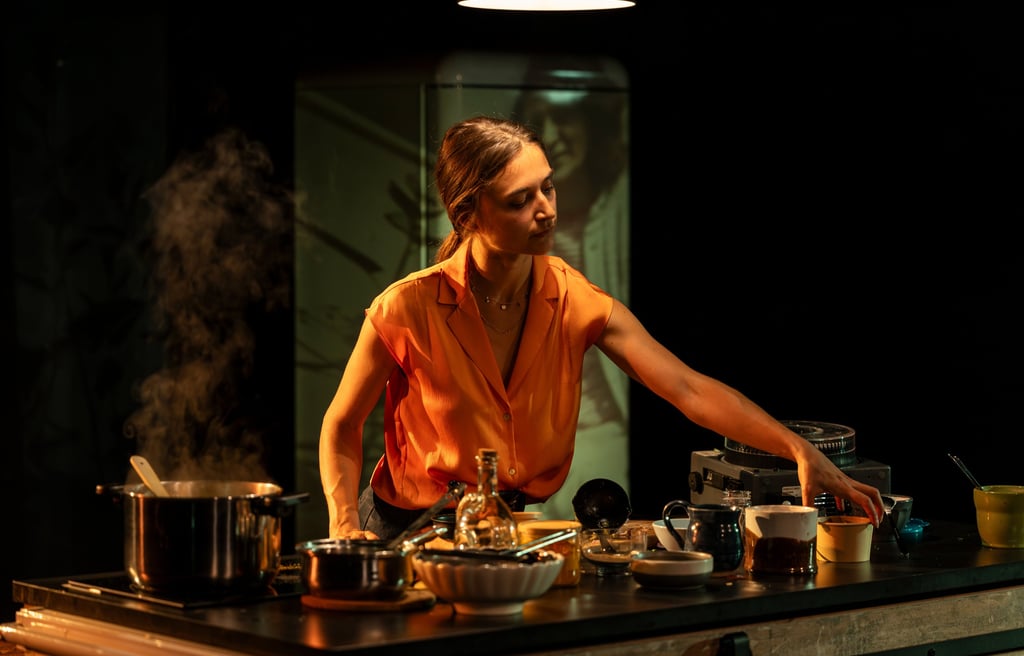REVIEW: My English Persian Kitchen - What Does The Food Mean to You?
Review Date: 2nd October 2025 @Soho Theatre
REVIEWS
Kassy Fang
10/5/20253 min read


Nicolas Bourriaud once wrote that “the role of artworks is no longer to form imaginary and utopian realities, but to actually be ways of living and models of action within the existing real.” My English Persian Kitchen, written by Hannah Khalil from a story by Atoosa Sepehr, directed by Chris White and performed with quiet intensity by Isabella Nefar, does exactly that. It offers a method, a lived, shared, sensory experience that unfolds through the act of cooking.
The story is simple and familiar, yet powerfully told. A woman flees an abusive marriage in Iran, forced to leave behind her family, her home, and everything she once knew. Arriving in the UK, she finds herself in a strange, indifferent place. What roots her here and what allows her to begin again is food. Through recreating the dishes of her childhood, she begins to reassemble herself. The kitchen becomes the space where memory, grief, fear, and joy all coexist. She cooks and speaks, and through these parallel acts, she survives.
The set, designed by Pip Terry, is modest but elegantly conceived. A stove faces the audience, and an open cupboard reveals ordinary objects: jars of pickles, a Persian coffee pot, a box grater softly lit from within. That grater, glowing like a miniature apartment block, evokes a whole world of anonymous homes and domestic lives, a beautiful and unexpected image of belonging. The ordinary becomes luminous. Even the danger of the kitchen is present: sharp knives and boiling water serve as subtle reminders of how violence lingers in the body long after the violent person is gone.
Marty Langthorne’s lighting design allows these shifts between past and present to flicker and blur. Shadows fall across the stage like memories. A light dims, and we’re suddenly in a flashback. Then it returns, and we’re back in the here and now. The character reminds herself urgently yet gently, “Focus. Today is the day. And the food, it’s going to be good.” Sound designer Dan Balfour complements this rhythm with a score that breathes in and out of the action: silence, noise, the clatter of pans, a door slamming, the hiss of oil in a hot pan. The audience is drawn into the fragmentation of memory, but also into the ritual of making something new.
Throughout the performance, the character prepares ash-e reshteh, a traditional Persian noodle soup. We watch as Nefar carefully begins the process: sautéing onions and garlic, adding saffron water, stirring in chopped spinach, mint, parsley, and coriander, draining chickpeas from tins, and breaking Japanese gluten-free noodles into the broth. We hear the crackle of oil, see the steam rise in arcs from the saucepan, and slowly the scent begins to drift through the dark theatre. It is grounding and immersive. The physical process of cooking unfolds in real time, becoming the narrative’s spine.
Along the way, fragments of life in Britain emerge: snippets of social encounters, observations of strangers, the small oddities of a new culture. There is humour too, how Londoners seem to have only one facial expression, or how tea functions as a kind of national personality. These details have appeared in many immigration stories before, yet here they feel renewed by their setting.
At the end of the performance, we are invited onto the stage to take a small bowl of the soup that has been simmering throughout. This gesture completes the arc of the performance through sharing. As Bourriaud suggests in his theory of relational aesthetics, art can function not only as representation but as a shared social experience, a moment of encounter. This is exactly what happens in this piece. The act of cooking onstage transforms into an invitation. The kitchen becomes a space not just of storytelling, but of hospitality.
We carry the food in our hands, taste it. The performance lingers in the bowl in your hand, in the mint and feta on your tongue, in the feeling of walking down a noisy Soho street carrying something made with care. My English Persian Kitchen shows how lives are rebuilt through persistent acts: sourcing unfamiliar ingredients, remembering the right ratios of herbs, and choosing to make something nourishing for someone else. In the private corners of kitchens, at weekend markets, over simmering pots, a sense of belonging is slowly stirred into being.
★★★★
My English Persian Kitchen is currently on tour. For more information, please visit: https://sohotheatre.com/events/my-english-persian-kitchen-2025-tour/
Credits
Writer: Hannah Khalil
Original Story: Atoosa Sepehr
Director: Chris White
Set & Costume Designer: Pip Terry
Lighting Designer: Marty Langthorne
Sound Designer: Dan Balfour
Associate Sound Designer: Richard Bell
Movement Director: Jess Tucker Boyd
Production Management: Harry Armytage for TPO Global
Associate Producer: Bronagh Leneghan
Technical Stage Manager: Rose Hockaday
Culinary Stage Manager: Lucie Jennings
©️Photo by Ellie Kurttz
Sound Behind Curtain
A place for all Asian artists.
© 2026 Sound Behind Curtain. All rights reserved.
Your gift keeps the curtain rising for Asian creatives.
About
Contact
